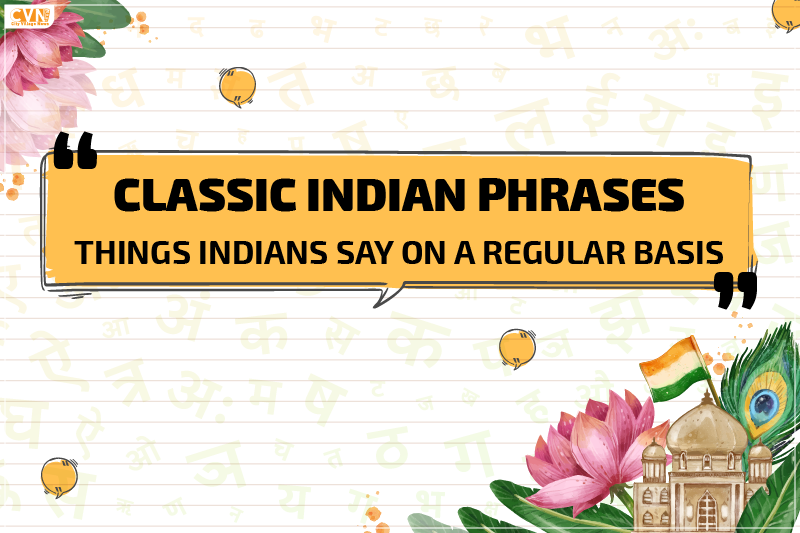We all know that the English language has many dialects. The linguistics of the English language reveals that English is a conglomeration of Anglicized words from different languages. It is interesting to know that certain words in English bear roots in the regional words of India. E.g., Bungalow is derived from Gujarati ‘bungalow.’ Likewise, a few words and phrases are used only in India as an extension of Indian English which we call Indianisms. From using ‘xerox’ instead of ‘photocopy’, ‘rubber’ replacing ‘eraser’, and ‘passed out’ to mean ‘graduated’ to inventing colloquial words like ‘batchmates’, ‘timepass’, ‘rowdy sheeter’, ‘monkey cap’, English is Indianised by the locals. Let’s look at a few conventional things only the Indians say. Indianism words exist and maybe this makes it unique. If you are wondering what is Indianism and want to know about the funny things Indians say, continue reading.
What is Indianism?
The meaning of Indianism refers to the unique cultural, linguistic, and social practices that are specific to India. It encompasses elements such as traditional customs, festivals, languages, and social norms. Indianisms also appear in the use of English, where unique phrases or grammar reflect Indian languages’ influence. This blend of traditions and modernity defines India’s rich cultural identity.
1. May I know your good name
The direct translation of Hindi usage “Shubh naam”, ‘good name’ is one of those common things only the Indians say. Though nothing as a good name or a bad name is intended or judged, Indians often add the word ‘good’ before ‘name’ in the questions like “What’s your name” or ” May I know your name” in order to sound polite and gentle while conversing with a stranger or to avoid embarrassment in that awkward situation when you have to address the other person by name but it doesn’t strike your mind!
2. Prepone to mean ‘rescheduling ahead of planned time’
Do you know that the Indian colloquialism ‘prepone’ was added to the Oxford English Dictionary in 2010, but is hardly adopted outside South Asia? One of the proudest inventions in Indian English, prepone is a word used to simply intend that something is going to happen before the scheduled time and functions as the antonym of “postpone”. Do you wish to prepone your travel plans to India? Start searching for some best deals before booking cheap flights to India.
3. The use of ‘only’
The peculiar way of using ‘only’ as an intensifier in a sentence is unique to India. Like in the phrases “Rs.500 only” or “You only promised me”, the word ‘only’ is used to emphasize the amount in the former and the Subject in the latter. Another interesting thing only the Indians say when they are at their casual best is ‘like that only’ to mean ‘just like that’ or ‘similar’. The typical exchange goes as “Do you know he bunked the college?” “No wonder, he is like that only!”
Suggested Read: 8 Cities with Best Weather in India for a Pleasant Holiday
4. Auntie/ Uncle to Address Someone
If you are holidaying in India and socializing with the people here, it is natural that a kid might call you ‘Auntie’ or ‘Uncle’. Addressing someone as ‘Auntie’ or ‘Uncle’ is one of the common things only the Indians say. Especially when the person whom they interact with is elderly. Be it familiar neighbors, parents of your friends or unknown passer-by, ‘Auntie’ or ‘Uncle’ is thought to be a more comfortable, warm and endearing way of addressing than as Mr or Mrs XYZ.
5. God Promise Or Mother Promise
Ever heard any youngster from India saying, “God Promise, I didn’t have the slightest idea about the mishap!”? It just means “I swear I didn’t…” This word has a nostalgic effect on most Indians and it instantly refreshes their childhood memories. In order to prove innocence against childish accusations, the person goes on to naively swear to God to emphasize that whatever they said is true. And all of this is meant in this phrase only the Indians say.
Suggested Read: Five ideal and exceptional offbeat destinations in North India
6. Do one thing
The phrase ‘Do one thing’ coined by literally translating the Hindi words “Ek kaam kar”. It is used as a preliminary statement before proposing a suggestion or advice to others. This is not only one of the most funny things Indians say but also one of the regularly heard things only the Indians say. Don’t go with the semantics of this Indianism, because you might get more than one advice because we Indians are really concerned.
7. Sit on My Head
“Sit on my head” is one of the things indian people say regularly. When an Indian says, “Don’t sit on my head about the deadline,” they mean someone is being overly demanding or nagging. This colorful expression, derived from regional languages, adds a touch of drama to conversations.
8. That Only
“That only!” is a phrase Indians use for emphasis or confirmation. For example, “You said it was on Friday, that only!” While the repetition might seem unnecessary, it adds a uniquely Indian flavor to communication.
Why Indianisms Are Special?
Indianisms are more than just quirky expressions; they are a reflection of India’s rich linguistic and cultural diversity. They add a unique charm to conversations and show how language evolves when influenced by regional languages and traditions. For those unfamiliar with these phrases, they may seem amusing or confusing, but for Indians, they are a matter of pride.
Next time you hear someone use Indianism, take a moment to appreciate its ingenuity and cultural significance. After all, these phrases make English in India unique and funny too.
These are some of the most common things Indians say on a daily basis. Next time you hear them on your visit to India from USA don’t think too much and go with the flow of Indians.
| Disclaimer: City Village News claims no credit for the images featured on its blog site. All the visual content is copyrighted to its respective owners only. We mention the source name of the picture whenever possible and found. However, please get in touch with us if we miss acknowledging the owner’s source. In case the owners don’t want us to use their images, we will remove them promptly. We believe in providing proper attribution to the original author, artist, and photographer. |

